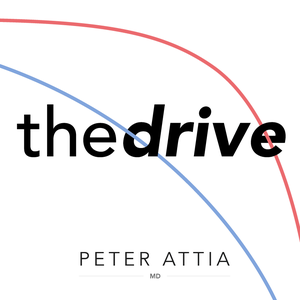
The Peter Attia Drive
Peter Attia, MD
- 47 minutes 53 seconds#310 - The relationship between testosterone and prostate cancer, testosterone replacement therapy, and tools for predicting cancer aggressiveness and guiding therapy | Ted Schaeffer, M.D., Ph.D.
View the Show Notes Page for This Episode
Become a Member to Receive Exclusive Content
Sign Up to Receive Peter’s Weekly Newsletter
Ted Schaeffer is an internationally recognized urologist specializing in prostate cancer and a returning guest on The Drive. In this episode, Ted provides insights into the role testosterone plays, or doesn't play, in the initiation and progression of prostate cancer. He unpacks the findings and limitations of the recent TRAVERSE trial, exploring the complex relationship between testosterone and prostate cancer. Ted delves into the molecular nature of prostate cancer, explaining the androgen receptor saturation theory and the potential impact of testosterone on cancer growth. He also discusses the use of the Decipher test to predict cancer aggressiveness and guide targeted treatment. Furthermore, Ted shares how he counsels patients regarding testosterone replacement therapy (TRT), including its safe administration in patients with low-grade prostate cancer. Additionally, he highlights advancements in prostate cancer therapies and biomarkers that help develop precise treatment strategies while minimizing the need for broad androgen deprivation therapy.
We discuss:
- Background on the TRAVERSE trial: insights into exogenous testosterone and prostate cancer risk [3:00];
- The androgen receptor saturation theory: how different organs respond to varying levels of testosterone [10:30];
- The relationship between testosterone levels and prostate cancer aggressiveness: how aggressive prostate tumors have lower androgen receptor activity and rely on different growth mechanisms [16:15];
- Using the Decipher score to assess prostate cancer aggressiveness and guide personalized treatment strategies [23:45];
- Considerations for testosterone replacement therapy: how Ted counsels patients, how TRT can be safely administered in patients with low-grade prostate cancer, and more [31:15];
- Advancements in prostate cancer therapies and PSA as a biomarker for precise treatment decisions, minimizing the need for broad androgen deprivation therapy [38:30]; and
- More.
Connect With Peter on Twitter, Instagram, Facebook and YouTube
22 July 2024, 8:00 am - 1 hour 55 minutes#309 ‒ AI in medicine: its potential to revolutionize disease prediction, diagnosis, and outcomes, causes for concern in medicine and beyond, and more | Isaac Kohane, M.D., Ph.D.
View the Show Notes Page for This Episode
Become a Member to Receive Exclusive Content
Sign Up to Receive Peter’s Weekly Newsletter
Isaac "Zak" Kohane, a pioneering physician-scientist and chair of the Department of Biomedical Informatics at Harvard Medical School, has authored numerous papers and influential books on artificial intelligence (AI), including The AI Revolution in Medicine: GPT-4 and Beyond. In this episode, Zak explores the evolution of AI, from its early iterations to the current third generation, illuminating how it is transforming medicine today and unlocking astonishing possibilities for the future. He shares insights from his unconventional journey and early interactions with GPT-4, highlighting significant AI advancements in image-based medical specialties, early disease diagnosis, and the potential for autonomous robotic surgery. He also delves into the ethical concerns and regulatory challenges of AI, its potential to augment clinicians, and the broader implications of AI achieving human-like creativity and expertise.
We discuss:
- Zak’s unconventional journey to becoming a pioneering physician-scientist, and his early interactions with GPT-4 [2:15];
- The evolution of AI from the earliest versions to today’s neural networks, and the shifting definitions of intelligence over time [8:00];
- How vast data sets, advanced neural networks, and powerful GPU technology have driven AI from its early limitations to achieving remarkable successes in medicine and other fields [19:00];
- An AI breakthrough in medicine: the ability to accurately recognize retinopathy [29:00];
- Third generation AI: how improvements in natural language processing significantly advanced AI capabilities [32:00];
- AI concerns and regulation: misuse by individuals, military applications, displacement of jobs, and potential existential concerns [37:30];
- How AI is enhancing image-based medical specialties like radiology [49:15];
- The use of AI by patients and doctors [55:45];
- The potential for AI to augment clinicians and address physician shortages [1:02:45];
- The potential for AI to revolutionize early diagnosis and prediction of diseases: Alzheimer’s disease, CVD, autism, and more [1:08:00];
- The future of AI in healthcare: integration of patient data, improved diagnostics, and the challenges of data accessibility and regulatory compliance [1:17:00];
- The future of autonomous robotic surgery [1:25:00];
- AI and the future of mental health care [1:31:30];
- How AI may transform and disrupt the medical industry: new business models and potential resistance from established medical institutions [1:34:45];
- Potential positive and negative impacts of AI outside of medicine over the next decade [1:38:30];
- The implications of AI achieving a level of creativity and expertise comparable to exceptional human talents [1:42:00];
- Digital immortality and legacy: the potential to emulate an individual's personality and responses and the ethical questions surrounding it [1:45:45];
- Parting thoughts [1:50:15]; and
- More.
Connect With Peter on Twitter, Instagram, Facebook and YouTube
15 July 2024, 8:00 am - 2 hours 46 minutesZone 2 training: impact on longevity and mitochondrial function, how to dose frequency and duration, and more | Iñigo San-Millán, Ph.D. (#201 rebroadcast)
View the Show Notes Page for This Episode
Become a Member to Receive Exclusive Content
Sign Up to Receive Peter’s Weekly Newsletter
Iñigo San-Millán is an internationally renowned applied physiologist and a previous guest on The Drive. His research and clinical work focuses on exercise-related metabolism, metabolic health, diabetes, cancer metabolism, nutrition, sports performance, and critical care. In this episode, Iñigo describes how his work with Tour de France winner Tadej Pogačar has provided insights into the amazing potential of elite athletes from a performance and metabolic perspective. He speaks specifically about lactate levels, fat oxidation, how carbohydrates in food can affect our lactate and how equal lactate outputs between an athlete and a metabolically unhealthy individual can mean different things. Next, he discusses how Zone 2 training boosts mitochondrial function and impacts longevity. He explains the different metrics for assessing one’s Zone 2 threshold and describes the optimal dose, frequency, duration, and type of exercise for Zone 2. Additionally, he offers his thoughts on how to incorporate high intensity training (Zone 5) to optimize health, as well as the potential of metformin and NAD to boost mitochondrial health. Finally, he discusses insights he’s gathered from studying the mitochondria of long COVID patients in the ICU.
We discuss:
- The amazing potential of cyclist Tadej Pogačar [2:00];
- Metrics for assessing athletic performance in cyclists and how that impacts race strategy [7:30];
- The impact of performance-enhancing drugs and the potential for transparency into athletes’ data during competition [16:15];
- Tadej Pogačar’s race strategy and mindset at the Tour de France [23:15];
- Defining Zone 2, fat oxidation, and how they are measured [26:00];
- Using fat and carbohydrate utilization to calculate the mitochondrial function and metabolic flexibility [35:00];
- Lactate levels and fat oxidation as it relates to Zone 2 exercise [39:15];
- How moderately active individuals should train to improve metabolic function and maximize mitochondrial performance [51:00];
- Bioenergetics of the cell and what is different in elite athletes [56:30];
- How the level of carbohydrate in the diet and ketogenic diets affects fuel utilization and power output during exercise [1:07:45];
- Glutamine as a source for making glycogen—insights from studying the altered metabolism of ICU patients [1:14:15];
- How exercise mobilizes glucose transporters—an important factor in diabetic patients [1:20:15];
- Metrics for finding Zone 2 threshold—lactate, heart rate, and more [1:24:00];
- Optimal Zone 2 training: dose, frequency, duration, and type of exercise [1:40:30];
- How to incorporate high intensity training (Zone 5) to increase VO2 max and optimize fitness [1:50:30];
- Compounding benefits of Zone 2 exercise and how we can improve metabolic health into old age [2:01:00];
- The effects of metformin, NAD, and supplements on mitochondrial function [2:04:30];
- The role of lactate and exercise in cancer [2:12:45];
- How assessing metabolic parameters in long COVID patients provides insights into this disease [2:18:30];
- The advantages of using cellular surrogates of metabolism instead of VO2 max for prescribing exercise [2:25:00];
- Metabolomics reveals how cellular metabolism is altered in sedentary individuals [2:33:00];
- Cellular changes in the metabolism of people with diabetes and metabolic syndrome [2:38:30]; and
- More.
Connect With Peter on Twitter, Instagram, Facebook and YouTube
8 July 2024, 8:00 am - 22 minutes 4 seconds#308 - AMA #61: Sun exposure, sunscreen, and skin health: relationship between sun exposure and skin cancer, vitamin D production, and photoaging, how to choose a sunscreen, and more
View the Show Notes Page for This Episode
Become a Member to Receive Exclusive Content
Sign Up to Receive Peter’s Weekly Newsletter
In this “Ask Me Anything” (AMA) episode, Peter delves into two topics that have generated a lot of questions over the years: skin cancer and sunscreen. He begins by exploring the basics of UV radiation, discussing its effects on vitamin D conversion, photoaging, and its role in skin cancer. He examines various skin types, discussing their implications for sun exposure and vitamin D levels, as well as how to determine where you fall on the skin type scale. He then delves into the various types of skin cancer, with a particular emphasis on melanoma, exploring its complex relationship with UV exposure and other contributing risk factors. Additionally, he covers tanning beds, the importance of early skin cancer detection through regular skin checks, and the often confusing topic of sunscreen. He explains how sunscreen affects UV radiation and skin cancer risk, what SPF levels to choose, the differences between organic and mineral sunscreens, and what to consider when selecting the best sunscreen for your needs.
If you’re not a subscriber and are listening on a podcast player, you’ll only be able to hear a preview of the AMA. If you’re a subscriber, you can now listen to this full episode on your private RSS feed or our website at the AMA #61 show notes page. If you are not a subscriber, you can learn more about the subscriber benefits here.
We discuss:
- The impact of UV radiation on the skin [2:00];
- Understanding solar UV: from the electromagnetic spectrum to skin health [3:45];
- The role of sunlight in vitamin D production [8:30];
- Factors contributing to vitamin D deficiency: insufficient UV exposure, magnesium levels, and more [9:45];
- Sun exposure needs for different skin types, and the limitations of current studies in defining vitamin D deficiency [12:45];
- The acute and long-term effects of excessive UV exposure: sunburn, photoaging, and the increased risk of skin cancer [15:30];
- Types of skin cancer and associations with UV exposure [17:45];
- The complex relationship between melanoma and UV exposure [22:15];
- Why UV exposure alone doesn’t necessarily explain the risk for melanoma [25:15];
- Other risk factors for melanoma [29:15];
- Tanning beds and skin cancer risk [34:45];
- Balancing sun exposure: benefits and risks [38:15];
- Tattoos and sun exposure [40:30];
- The importance of regular skin checks, dermatologists, and emerging technologies showing promise for early detection of cancer [41:45];
- Self-skin checks: what to look for [46:30];
- Prevalence of skin cancer and the importance of early detection [49:30];
- Summary of the major risk factors for melanoma [54:15];
- The role of sunscreen in reducing skin cancer risk [55:45];
- How sunscreen works, the differences between chemical and mineral sunscreens, an explanation of SPF, and more [58:30];
- How to determine the appropriate sunscreen SPF to use based on the UV index [1:04:45];
- Choosing the right sunscreen for your individual needs [1:07:00];
- The impact of water and perspiration on sunscreen effectiveness [1:12:00];
- Chemical vs. mineral sunscreens: safety concerns and recommendations [1:14:00];
- Concerns about hormone effects from chemical sunscreens [1:19:15];
- Sunscreen summary: skin types, key considerations, recommended brands, and more [1:23:15]; and
- More.
Connect With Peter on Twitter, Instagram, Facebook and YouTube
1 July 2024, 8:00 am - 1 hour 39 minutes#307 ‒ Exercise for aging people: where to begin, and how to minimize risk while maximizing potential | Peter Attia, M.D.
View the Show Notes Page for This Episode
Become a Member to Receive Exclusive Content
Sign Up to Receive Peter’s Weekly Newsletter
In this special episode, Peter addresses the common questions about starting or returning to an exercise routine over the age of 50. Individuals in this age group have frequently reached out with questions about whether it's too late to start exercising and often express concern over a lack of prior training, a fear of injury, or uncertainty about where to begin. Peter delves into the importance of fitness for older adults, examining all four pillars of exercise, and provides practical advice on how to start exercising safely, minimize injury risk, and maximize potential benefits. Although this conversation focuses on people in the “older” age category, it also applies to anyone of any age who is deconditioned and looking to ease into regular exercise.
We discuss:
- Key points about starting exercise as an older adult [2:45];
- Why it’s never too late to begin exercising and incorporating the four pillars of exercise [5:45];
- The gradual, then sharp, decline in muscle mass and activity level that occur with age [10:00];
- The decline of VO2 max that occurs with age [15:30];
- Starting a training program: exercise variability, movement quality, realistic goals, and more [18:30];
- Improving aerobic capacity: the malleability of the system, the importance of consistency, and setting long-term fitness goals [25:15];
- Starting cardio training: base building, starting with low volume, and zone 2 training [30:45];
- The critical role of VO2 max in longevity [36:45];
- How to introduce VO2 max training to older or deconditioned individuals [46:15];
- Options for performing zone 2 and VO2 max training [53:45];
- The ability to make gains in strength and muscle mass as we age [57:00];
- How to implement strength training for older individuals [1:01:00];
- Advice for avoiding injury when strength training [1:07:30];
- Risk of falls: the devastating consequences and the factors that increase fall risk [1:12:15];
- Mitigating fall risk: the importance of foot and lower leg strength, ankle mobility, and balance [1:19:45];
- Improving bone mineral density through resistance training [1:24:30];
- The importance of protein in stimulating muscle protein synthesis, especially in older adults [1:31:00];
- Parting advice from Peter [1:34:00]; and
- More.
Connect With Peter on Twitter, Instagram, Facebook and YouTube
24 June 2024, 8:00 am - 18 minutes 15 seconds#306 - AMA #60: preventing cognitive decline, nutrition myths, lowering blood glucose, apoB, and blood pressure, and more
View the Show Notes Page for This Episode
Become a Member to Receive Exclusive Content
Sign Up to Receive Peter’s Weekly Newsletter
In this “Ask Me Anything” (AMA) episode, Peter provides insights on a broad range of important topics. He delves into the prevention of cognitive decline, the link between cardiovascular disease and Alzheimer's disease, and methods to lower blood glucose, insulin, and apoB. He also addresses nutrition-related queries, exploring the impact of dietary habits on weight loss and longevity, how a person can identify the best diet for themselves, and common nutrition myths. Additional discussions include optimal blood pressure, daily step goals, the benefits of standing versus sitting desks, and much more.
If you’re not a subscriber and are listening on a podcast player, you’ll only be able to hear a preview of the AMA. If you’re a subscriber, you can now listen to this full episode on your private RSS feed or our website at the AMA #60 show notes page. If you are not a subscriber, you can learn more about the subscriber benefits here.
We discuss:
- Overview of topics and episode format [1:40];
- Preventing cognitive decline [5:00];
- How to lower blood glucose and insulin [13:30];
- The relationship between lipids, CVD, and Alzheimer’s disease, and whether statins can increase the risk of neurodegenerative disorders and AD [23:15];
- Reducing apoB levels through exercise and diet [31:45];
- Pharmacological options for lowering apoB [38:00];
- How nutrition impacts longevity via metabolic health, muscle mass, BMD and more [40:15];
- How can someone determine the best diet for themselves? [43:45];
- Nutrition myth: All weight loss is good [46:45];
- Nutrition myth: Metabolic rates are dramatically different among individuals based on genetics [49:00];
- Nutrition myth: Losing weight after a brief period of overeating is impossible [53:45];
- Nutrition myth: GLP-1 agonists are a replacement for a healthy lifestyle [57:45];
- Nutrition myth: There is a single best diet for weight loss [1:03:00];
- Nutrition oversimplification: All calories are created equal [1:05:45];
- Daily step goals [1:06:45];
- The benefits of standing versus sitting throughout the day [1:10:45];
- How to identify the most impactful and easiest-to-implement ways to improve your health [1:12:30];
- The critical importance of emotional health [1:14:30];
- Why supplements should be considered as supportive aids rather than primary solutions in one’s strategy to improve longevity [1:18:00];
- Strategies for reducing high blood pressure [1:20:45];
- Peter’s biggest frustrations with "mainstream health advice" [1:28:00];
- Peter’s chaotic, yet cherished, morning routine [1:31:00]; and
- More.
Connect With Peter on Twitter, Instagram, Facebook and YouTube
17 June 2024, 8:00 am - 1 hour 51 minutes#305 ‒ Heart rate variability: how to measure, interpret, and utilize HRV for training and health optimization | Joel Jamieson
View the Show Notes Page for This Episode
Become a Member to Receive Exclusive Content
Sign Up to Receive Peter’s Weekly Newsletter
Joel Jamieson is a conditioning expert who developed Morpheus to give people a smarter way to build their conditioning regimen and improve their recovery. In this episode, Joel dives deep into the world of heart rate variability (HRV), explaining its scientific foundation, how it measures the balance between the sympathetic and parasympathetic nervous systems, the various methods of measurement, and how it can guide healthier lifestyle choices and improved training performance. He explores the nuances of HRV calculation, the impact of aging on HRV, and the roles of genetics, exercise, and other lifestyle factors in this process. He also covers Morpheus, the innovative training tool that won Peter over after his initial skepticism, highlighting its practicality and effectiveness in guiding training and optimizing fitness outcomes.
We discuss:
- Heart rate variability (HRV): evolution, science, and practical applications of HRV in athletic training [4:00];
- Methods of measuring HRV: EKG, wrist-based sensors, and more [11:30];
- How HRV is calculated from the data [22:30];
- The role of the autonomic nervous system (ANS) in regulating HRV [25:45];
- The decline in HRV with age, and the mitigating effects of fitness and other lifestyle factors [33:30];
- The role of genetics in HRV, the modifiability of HRV, and a comparison of VO2 max and HRV as predictors of mortality [37:00];
- How aging affects HRV and sympathetic drive, and the importance of spontaneous movement and exercise in maintaining the body's adaptability [43:30];
- How Morpheus measures HRV using RMSSD and normalizes it to a 100-point scale for easier interpretation [49:45];
- The Morpheus system: development, integration with various metrics, and personalized daily training recommendations to optimize fitness and recovery [51:30];
- The benefits of morning HRV readings for assessing daily readiness compared to overnight HRV measurements [1:03:00];
- Why Morpheus recommends using a chest strap rather than an arm band [1:10:00];
- The impact of consistent exercise, stress, alcohol, and other lifestyle factors on HRV [1:11:15];
- Optimizing zone 2 training with Morpheus [1:18:15];
- Using heart rate recovery (HRR) as an indicator of athletic conditioning and the balance between aerobic and anaerobic systems [1:22:45];
- The importance of tracking HRV trends over time rather than focusing on data from a given day [1:29:00];
- Effect of GLP-1 agonists on heart rate and HRV [1:34:45];
- Where HRV belongs in the hierarchy of health metrics [1:42:00];
- Parting thoughts [1:46:30]; and
- More.
Connect With Peter on Twitter, Instagram, Facebook and YouTube
10 June 2024, 8:00 am - 30 minutes 44 seconds#304 – NEW: Introducing quarterly podcast summaries - Peter shares his biggest takeaways on muscle protein synthesis, VO2 max, toe strength, gut health, and more
View the Show Notes Page for This Episode
Become a Member to Receive Exclusive Content
Sign Up to Receive Peter’s Weekly Newsletter
In this quarterly podcast summary (QPS) episode, Peter introduces a new format aimed at summarizing his biggest takeaways from the last three months of guest interviews on the podcast. Peter shares key insights from each episode, covering diverse topics such as protein and muscle building with Luc van Loon, toe strength with Courtney Conley, VO2 max with Olav Aleksander Bu, liquid biopsies for cancer with Alex Aravanis, gut health and probiotics with Colleen Cutcliffe, and road safety with Mark Rosekind. Additionally, Peter shares any personal behavioral adjustments or modifications to his patient care practices that have arisen from these engaging discussions.
If you’re not a subscriber and are listening on a podcast player, you’ll only be able to hear a preview of the AMA. If you’re a subscriber, you can now listen to this full episode on your private RSS feed or our website at the episode #304 show notes page. If you are not a subscriber, you can learn more about the subscriber benefits here.
We discuss:
- How Peter keeps track of his takeaways from each podcast episode [5:15];
- Luc van Loon episode: fat utilization, muscle protein synthesis, dietary protein, aging and inactivity, and more [8:45];
- Behavioral changes that have come about from the conversation with Luc van Loon [23:45];
- Courtney Conley episode: importance of toe strength and the impact of dedicated foot training [26:45];
- Olav Aleksander Bu episode: the importance of VO2 max for lifespan, and the practicalities of measuring and improving VO2 max [36:45];
- Behavioral changes that have come about from the conversation with Olav [56:00];
- Alex Aravanis episode: liquid biopsies for cancer detection [1:01:30];
- Colleen Cutcliffe episode: the importance of gut bacteria balance, and the potential therapeutic uses of probiotics, particularly Akkermansia [1:16:45];
- Mark Rosekind: the significant issue of road fatalities and injuries, their causes, and practical safety measures to reduce risks [1:27:00]; and
- More.
Connect With Peter on Twitter, Instagram, Facebook and YouTube
3 June 2024, 8:00 am - 2 hours 5 minutes#303 - A breakthrough in Alzheimer’s disease: the promising potential of klotho for brain health, cognitive decline, and as a therapeutic tool for Alzheimer's disease | Dena Dubal, M.D., Ph.D.
View the Show Notes Page for This Episode
Become a Member to Receive Exclusive Content
Sign Up to Receive Peter’s Weekly Newsletter
Dena Dubal is a physician-scientist and professor of neurology at UCSF whose work focuses on mechanisms of longevity and brain resilience. In this episode, Dena delves into the intricacies of the longevity factor klotho: its formation and distribution in the body, the factors such as stress and exercise that impact its levels, and its profound impact on cognitive function and overall brain health. Dena shares insights from exciting research in animal models showing the potential of klotho in treating neurodegenerative diseases as well as its broader implications for organ health and disease prevention. She concludes with an optimistic outlook for future research in humans and the potential of klotho for the prevention and treatment of Alzheimer’s disease.
Disclosure: Peter is an investor in Jocasta Neuroscience, a company working to develop klotho as a therapy for people with Alzheimer’s disease.
We discuss:
- Dena’s fascination with aging and how she came to study klotho [3:30];
- Biological properties of klotho: production, regulation, decline with age, and factors influencing its levels [11:45];
- Potential benefits of klotho on brain health [22:00];
- The relationship between soluble klotho protein, platelet factors, and cognitive enhancement [33:45];
- The role of platelet factor 4 (PF4) and it’s interaction with GluN2B in mediating cognitive enhancement [46:45];
- Benefits of klotho observed in a mouse model of Parkinson’s disease [55:45];
- Benefits of klotho observed in a mouse model of Alzheimer’s disease [1:03:00];
- Promising results of klotho in primate models, and the importance of finding an appropriate therapeutic dose before moving to human trials [1:08:00];
- Speculating why a single klotho injection has such long-lasting effects [1:25:30];
- Potential cognitive benefits of klotho in humans, the impact of the KL-VS genetic variant on klotho levels, and the need for human trials to confirm these effects [1:27:45];
- The interaction between the KL-VS genetic variant and APOE4 and how it impacts risk of Alzheimer’s disease [1:34:45];
- The significance of klotho levels: studies linking lower levels to increased mortality and the broader implications for organ health and disease prevention [1:47:15];
- Measuring klotho levels and determining an individual’s KL-VS status [1:52:15];
- The promising potential of klotho for Alzheimer’s disease treatment, and the importance of philanthropy for funding research [1:58:00]; and
- More.
Connect With Peter on Twitter, Instagram, Facebook and YouTube
27 May 2024, 8:00 am - 2 hours 25 minutes#302 - Confronting a metabolic epidemic: understanding liver health and how to prevent, diagnose, and manage liver disease | Julia Wattacheril, M.D., M.P.H.
View the Show Notes Page for This Episode
Become a Member to Receive Exclusive Content
Sign Up to Receive Peter’s Weekly Newsletter
Julia Wattacheril is a physician scientist and director of the Metabolic Dysfunction Associated Steatotic Liver Disease (MASLD) program at Columbia University Irving Medical Center. In this episode, Julia delves deep into the complex world of liver health, beginning with a foundational overview of liver physiology. She provides an in-depth look at how alcohol impacts liver function, breaking down the metabolism of ethanol and its detrimental effects. Julia then shifts the focus to understanding liver function tests and optimal enzyme levels, providing a detailed explanation of AST and ALT and elucidating why fluctuations in these levels may or may not be concerning. She provides a primer on the four major stages of liver disease, discussing risk and emphasizing the importance of early diagnosis. Julia highlights the role of liver disease in increasing the risk of cancer and cardiovascular disease and covers in detail the various strategies for diagnosing, treating, and preventing the progression of liver disease.
We discuss:
- Julia’s training, the importance of liver health, and the challenges and innovations of hepatology [3:15];
- The complex and crucial functionality of the liver, its four most essential functions, and more [8:45];
- Liver injuries: historical and evolving understanding of causal factors, and the progression to liver diseases and cancer [13:15];
- How the liver metabolizes nutrients and what happens in the presence of excess calories or alcohol [24:45];
- Methods of diagnosing liver disease and how insights guide treatment and management strategies [33:30];
- The poisonous nature of ethanol to the liver [40:30];
- Varied responses to alcohol, damaging effects of alcohol beyond the liver, and the process of advising patients on their alcohol consumption [47:15];
- Understanding liver enzymes AST and ALT—interpreting levels, lifestyle factors that affect them, and diagnostic approaches [58:30];
- Interpreting liver function tests for fatty liver disease, and the challenges of diagnosing liver pathologies, particularly in children versus adults [1:13:15];
- Comprehensive liver health assessments via imaging and various diagnostic tools to prevent overlooking potential liver pathologies [1:18:45];
- Potential impact of recreational drugs, statins, and other medications on liver function test results [1:26:45];
- Shifting nomenclature from NAFLD to MASLD to reflect accuracy in the underlying pathophysiology and understanding of liver diseases [1:30:30];
- Pathophysiology of MASLD, the need for proactive screening, and the significance of liver fat percentage as an indicator of metabolic health [1:36:30];
- The importance of screening for rare conditions alongside common metabolic diseases associated with fatty liver accumulation [1:42:45];
- Practical strategies for managing MAFLD [1:45:30];
- The impact of fructose consumption on liver health and the challenges of disentangling its effects from other factors like obesity and insulin resistance [1:52:45];
- The potential of GLP-1 agonists for the treatment of MASLD [1:57:45];
- How the four stages of liver disease have evolved [2:00:30];
- Increased cancer and heart disease risk associated with early-stage MAFLD [2:05:15];
- Emerging drugs and therapies for addressing fat accumulation and fibrosis related to MAFLD [2:12:15];
- Peter’s major takeaways [2:18:45]; and
- More.
Connect With Peter on Twitter, Instagram, Facebook and YouTube
20 May 2024, 8:00 am - 24 minutes 18 seconds#301 - AMA #59: Inflammation: its impact on aging and disease risk, and how to identify, prevent, and reduce it
View the Show Notes Page for This Episode
Become a Member to Receive Exclusive Content
Sign Up to Receive Peter’s Weekly Newsletter
In this “Ask Me Anything” (AMA) episode, Peter delves into the often misunderstood concept of inflammation. He first defines inflammation and differentiates between acute inflammation and chronic inflammation, the latter of which is linked to aging and a plethora of age-related diseases. Peter breaks down the intricate relationship between chronic inflammation, obesity, and metabolic health, and highlights the signs that might suggest someone may be suffering from chronic inflammation. From there, the conversation centers on actionable advice and practical steps one can take to manage and minimize chronic inflammation. He explores how diet plays a crucial role, including the potential benefits of elimination diets, and he examines the impact of lifestyle factors such as exercise, sleep, and stress management. Additionally, he discusses the relevance of food inflammatory tests and concludes by examining the potential benefits and drawbacks of drugs and supplements in managing inflammation.
If you’re not a subscriber and are listening on a podcast player, you’ll only be able to hear a preview of the AMA. If you’re a subscriber, you can now listen to this full episode on your private RSS feed or our website at the AMA #59 show notes page. If you are not a subscriber, you can learn more about the subscriber benefits here.
We discuss:
- Defining inflammation (and the cultural impact of Napoleon Dynamite) [1:45];
- Acute vs chronic inflammation [8:00];
- The connection between chronic inflammation, aging, and age-related diseases [11:00];
- The impact of inflammation on metabolic health [18:30];
- Understanding and diagnosing chronic inflammation: blood tests and other approaches, and challenges with measurement [20:00];
- Factors that contribute to low-level chronic inflammation [28:00];
- Minimizing inflammation through diet [29:45];
- The important role of fiber for gut health and inflammation [33:45];
- A closer look at the impact of trans fats and saturated fats on overall health [34:45];
- Why Peter prefers dietary fiber from food sources over supplements [38:30];
- Debunking “superfoods”: emphasizing proven methods over marketing claims for reducing inflammation [39:00];
- Is there any value in over-the-counter food inflammatory tests? [42:30];
- Food elimination diets: how they work, symptoms and markers to watch, challenges and limitations [45:15];
- Identifying dietary triggers for gut-related symptoms through low-FODMAP diets like the “carnivore diet” [51:15];
- Dairy: the complex role of dairy on inflammation and individual responses [55:00];
- Wheat: the complexities and conflicting evidence around wheat's inflammatory effects [57:45];
- How exercise influences inflammation [1:02:00];
- How sleep quality and duration impacts inflammation [1:07:00];
- The potential impact of chronic psychological stressors on inflammation [1:13:00];
- The impact of oral health on inflammation and overall well-being [1:15:00];
- The role of medications in managing chronic inflammation [1:18:15];
- Supplements: evaluating the efficacy of various anti-inflammatory supplements [1:22:15];
- Parting thoughts and takeaways [1:27:00]; and
- More.
Connect With Peter on Twitter, Instagram, Facebook and YouTube
13 May 2024, 8:00 am - More Episodes? Get the App
Your feedback is valuable to us. Should you encounter any bugs, glitches, lack of functionality or other problems, please email us on [email protected] or join Moon.FM Telegram Group where you can talk directly to the dev team who are happy to answer any queries.
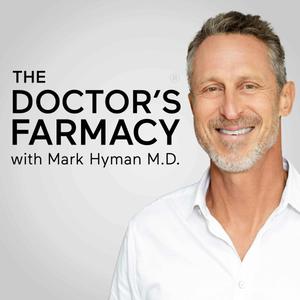 The Doctor's Farmacy with Mark Hyman, M.D.
The Doctor's Farmacy with Mark Hyman, M.D.
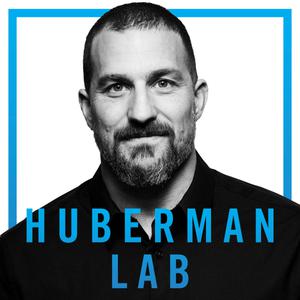 Huberman Lab
Huberman Lab
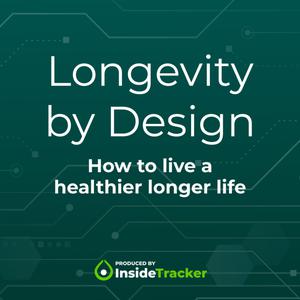 Longevity by Design
Longevity by Design
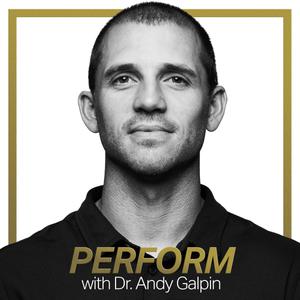 Perform with Dr. Andy Galpin
Perform with Dr. Andy Galpin
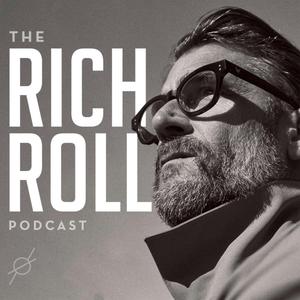 The Rich Roll Podcast
The Rich Roll Podcast
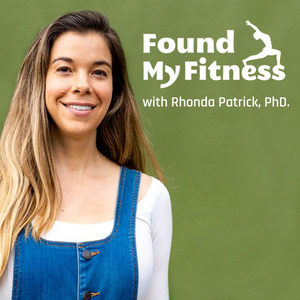 FoundMyFitness
FoundMyFitness